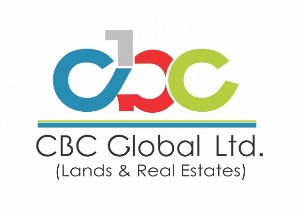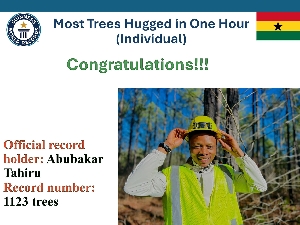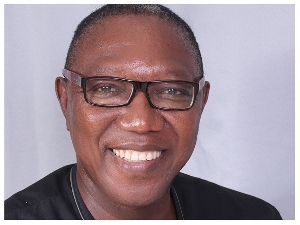 File photo: The writer is the CEO and Lead Broker for CBC Global Limited
File photo: The writer is the CEO and Lead Broker for CBC Global Limited
Before I started my real estate business, I knew next to nothing about real estate. Interestingly, people see me today and do not believe I was once a novice. In Ghana my beloved country, many people including educated people do not still understand what real estate is and how it works.
It may not be their fault, because even at the national level, real estate is not seen as an independent sector but a small branch of the construction industry. Be that as it may, the construction contributed GHS13.7bn ($3.8bn) to GDP in 2014 at current prices, according to the Ghana Statistical Service.
This was 12.7% of total GDP and up 26.9% from GHS10.8bn ($2.9bn) in 2013. The sector has grown strongly over the past decade, from GHS1.01bn ($280.3m) in 2006, and has become one of increasing importance to the broader economy, more than doubling as a contributor to GDP from 5.7% in 2006.
The Bank of Ghana’s Research of the Housing Market in Ghana indicates that it will take ten years to build one million units to fill a housing deficit of about 1.7 miilion units currently.
Thank God there have been an exponential number of real estate developers over the last decade, meaning the services of real estate brokers are gradually becoming a necessity than a luxury. This presupposes that real estate transactions in the last decade has constantly been on the ascendancy, however there is little education and understanding on how the real estate sector works hence, making it see a sluggish growth.
In this write-up, I will attempt to break down what real estate is and try to cover key things you need to know about real estate. I will run it as a series with the aim of making real estate very easy to understand and relate with.
Real Estate has many meanings, but from my experience and readings, it is a property consisting of land (air rights above it, surface rights on it and underground rights below it), the buildings on it, as well as the natural resources of the land, thus vegetation and wildlife, water and other minerals (gold, salt, diamond etc.).
Simply put, Real Estate is the immovable or fixed portion of one’s property, that is, land and its associated fittings; be it artificially added or naturally rooted.
If one is said to own a real estate or wants to own one, that person must have the title to the real estate which gives him/her authority and control over the air rights, mineral rights, and surface rights which can be sold, bought, leased or transferred together or separately. Another name for real estate is real property or realty.
Real Estate can be categorised into three or four depending on which part of the world one finds him/herself. They are Residential, Commercial, Industrial and Land. In some jurisdictions, residential real estate includes land, hence making it three categories.
Just as the name goes, Residential Real Estate is an area or land devolved for people to live. It can be either newly constructed or an existing home that is being resold to another. In Ghana we can talk about single rooms, hall and chamber, self-contained, flats, detached, semidetached, high-end apartments among others.
While Commercial Real Estate refers to any property owned for the purpose of income generation. Thus the property is used for business (activities that generate income); example, shopping centers and malls, medical and educational buildings, hotels and offices etc. In recent times, some apartments are considered commercial since they are owned to produce income.
Industrial Real Estate covers all kinds of lands and building which are used or suitable for industrial activities such as manufacturing, assembling, warehousing, research, production, storage and distribution of goods.
Finally, we have Land which refers to a space on the earth that can be used for residential, commercial and industrial purposes. This space extends above the land into the sky or beneath the earth. We can talk of vacant land, farms and ranches, undeveloped, land at initial development stage etc.
These classification of real estate is very important because that is what informs how a property is zoned, what construction goes on it, how they are sold and how they are handled.
Mind you, the various categories as listed above are a whole subject on their own which we may look at in future, but for now, it should be enough to make you understand the basics.
Now, the entity and the whole range of activities that connects buyers and sellers of a real estate to facilitate a transaction is what is referred to as Real Estate Brokerage.
In developed countries like the United State of America, Canada and the UK among others, Real Estate Brokerage is a branch of the entire Real Estate Industry. However, in developing countries like Ghana and many others in Africa, the industry in its true sense is none-existent.
In fact, it will be an exaggeration to call it a Real Estate Sector in Ghana. The sector, despite the many strides in recent years, is still at its young age with the associated teething challenges.
Be that as it may, the key actors in Real Estate Brokerage is the Real Estate Brokerage Firm, The Real Estate Broker, Real Estate Agent and the REALTOR. These actors are those who facilitate the transaction between sellers and buyers of real estate.
Apart from the Real Estate Brokerage Firm which is simply understood as the company that undertakes a wide range of activities to facilitate real estate transaction between parties, the other actors are used interchangeably although they are not the same. Our young sector can be pardoned for such blunders.
This is one of the challenges that this series of mine seeks to cure, to educate the populace on the sector so we can grow it together.
Having said this, one may ask, what is the difference; a broker, agent and realtor?
I am aware you really want to know the difference. Unfortunately, this is all time will permit. Watch this space for the part two of this series. Until then, it has been your trusted Real Estate Broker; Chris Nii.
The writer, Chris Nii Abossey is the CEO and Lead Broker, CBC Properties (CBC Global Limited), Licensed Realtor and Member, National Association of Realtors (US); Member, Ghana Association of Real Estate Brokers (GAR); Email: ceo@cbcghanaltd.com Cell: 0204225002
- Investing in Saglemi Housing Project a wasteful venture – Asenso-Boakye
- Affordable houses not affordable to poor - NPP MP
- Asenso-Boakye inspects Saglemi affordable housing project
- Affordable Housing Crunch: Ghana races against time to avert housing crisis
- We’ll blacklist contractors who do shoddy works – Housing Minister
- Read all related articles












